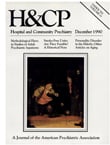Personality Disorder in the Elderly
Abstract
Psychiatrists tend not to ascribe personality disorder to elderly patients who present with psychiatric or medical illness, perhaps because of the difficulty of defining personality disorder in older persons or because of the belief that it does not exist among the elderly. Based on a review of the literature, the author concludes that personality and personality disorder are most reliably described in behavioral terms and that normal aging can change preexisting behaviors and produce new behaviors. However, personality remains relatively stable as people age, and healthy personality traits are as durable as pathological personaity traits. Finally, he concludes that the elderly are not immune from personality disorder but that age-related behavioral changes may mask the presence of the disorder. Therefore, diagnostic guidelines for personality disorder should include age-associated criteria.
Access content
To read the fulltext, please use one of the options below to sign in or purchase access.- Personal login
- Institutional Login
- Sign in via OpenAthens
- Register for access
-
Please login/register if you wish to pair your device and check access availability.
Not a subscriber?
PsychiatryOnline subscription options offer access to the DSM-5 library, books, journals, CME, and patient resources. This all-in-one virtual library provides psychiatrists and mental health professionals with key resources for diagnosis, treatment, research, and professional development.
Need more help? PsychiatryOnline Customer Service may be reached by emailing [email protected] or by calling 800-368-5777 (in the U.S.) or 703-907-7322 (outside the U.S.).



